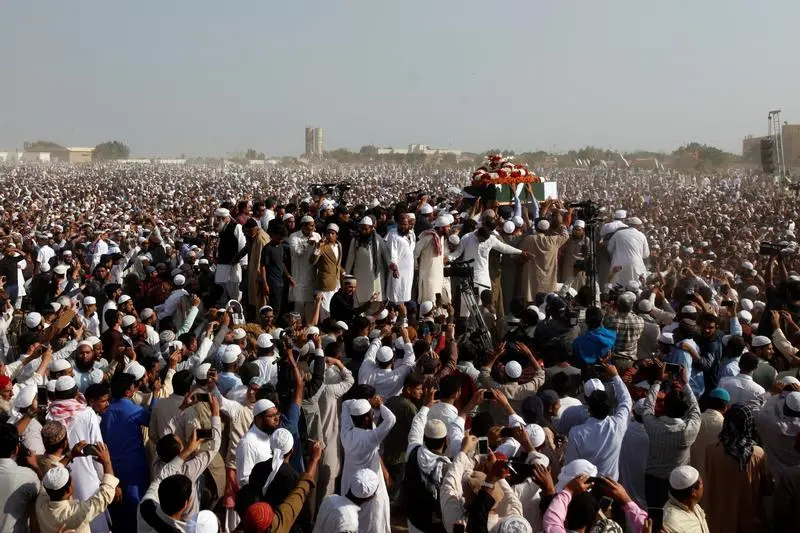PHOTO
Thursday, Dec 15, 2016
Karachi: Thousands of Pakistanis Thursday bid farewell to Junaid Jamshed, the top pop pioneer of the country who later devoted himself to religion, who died in a last week plane crash.
Pakistani politicians, senior officials of Pakistan armed forces, cricketers, singers and actors attended the funeral prayers besides thousands of his fans at a cricket ground in the Defence Housing Society.
Jamshed, 52, died in the plane crash on December 7 near Islamabad, the Pakistani capital city, along with his wife and 45 other ill-fated passengers aboard a Pakistan national flag carrier.
Dozens of Pakistani national television channels held live marathon broadcast of his funeral for hours.
Different famous numbers of his religious recitations were also being broadcast to mark his funeral.
“I cannot believe that Junaid is no more with us,” Maulana Tariq Jamil, a renowned Islamic preacher, who led the funeral prayer remarked during his sermon ahead of the prayer.
Junaid’s funeral was pending for a week as a DNA report to ascertain his body remains was awaited after the plane crash that left no body on-board intact whereas many were burnt beyond recognition.
His body was flown here from Islamabad last night to be buried at the graveyard of Darul Ulom Korangi, a prestigious Islamic seminary.
He died alongside his second wife, Nahya, and is survived by his first wife Ayesha as well as four children.
Born in Karachi on September 3, 1964, he shot to fame in the late 1980s as lead singer of the boy band ‘Vital Signs’, where his dashing looks and brooding vocals made him a style icon and heart-throb for a generation emerging from the harsh Islamist rule of military dictator Zia-ul-Haq.
The band’s fusion of Western guitar-driven pop set to traditional tabla beats inspired a new genre — Sufi Rock — that is hugely popular throughout South Asia today.
Their greatest hit, ‘Dil Dil Pakistan’, an upbeat ode to the homeland with a synthesiser-heavy 1980s sound, remains an unofficial national anthem.
Many of his biggest fans became critics when in the early 2000s he left his career in pop to become a member of the Tableeghi Jamaat, a Sunni evangelical group that preaches its austere brand of Islam throughout the world.
Jamshed ditched his leather jackets and stonewashed jeans for traditional tunic and baggy trousers, grew a beard, and began recording religious ‘Naats’ — hymns that are sung a capello, because instruments are seen as ‘haraam’ (forbidden).
Pakistani progressives’ disappointment only grew as Jamshed made a series of controversial statements, often targeting women, including famously telling a female TV host that women should not be allowed to drive or leave the home without male guardians.
But his new guise also endeared him to religious conservatives who followed his TV appearances closely and regarded him as a role model for leaving a decadent lifestyle behind.
In 2014, he found himself embroiled in controversy for appearing to criticise one of the wives of the Prophet Mohammad (Peace Be Upon Him) in one of his sermons, prompting a blasphemy case against him.
He issued a tearful apology and the case was not pursued — his strong connections with the country’s religious right seemingly shielding him from the persecution minorities often face when charged or even accused of the same crime.
By Mohammad Ashraf Correspondent
Gulf News 2016. All rights reserved.





















